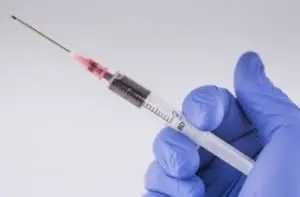Chemical-resistant gloves are made to protect the wearer from dangerous chemicals they will contact during their workday. But can these gloves also resist punctures? Keep reading to find out.
What are chemical-resistant gloves?
Chemical-resistant gloves are gloves that are designed to protect your hands from harsh chemicals. They are usually made of latex, nitrile, or vinyl.
Are chemical-resistant gloves puncture-proof?
No, most chemical-resistant gloves are not puncture-proof. However, you can find chemical-resistant gloves that offer some puncture resistance. However, thick puncture-proof gloves can be worn over chemical-resistant gloves to add this capability.
What are the benefits of using chemical-resistant gloves?
There are many benefits of using chemical-resistant gloves. They provide a barrier between your skin and the hazardous substance, they help to prevent absorption of the substance through your skin, and they can protect your hands from injuries such as cuts or punctures.
Chemical-resistant gloves are made from a variety of materials, including latex, vinyl, nitrile, and neoprene. Each type of material has its own advantages and disadvantages, so it is important to choose the right type of glove for the job.
What are the different types of chemical-resistant gloves?
Workers can use three different types of gloves to protect their hands from chemicals: natural rubber, nitrile, and neoprene. Each type of glove has its own advantages and disadvantages. Natural rubber gloves are the most economical choice and provide good resistance to a wide variety of acids, bases, and other chemicals. However, natural rubber does not provide good resistance to oils and greases, so it is not the best choice for workers who need to handle these materials.
Nitrile gloves are more expensive than natural rubber gloves, but they provide better resistance to oils and greases. Nitrile is also a good choice for workers who need to handle strong acids or bases.
Neoprene gloves are the most expensive type of chemical-resistant glove, but they provide the best resistance to oils, greases, and a wide variety of chemicals. Neoprene is also a good choice for workers who need to handle very cold materials.
What are the features of chemical-resistant gloves?
There are many features to look for when choosing the right chemical-resistant gloves. Here are a few key features to keep in mind:
Material: Butyl rubber, nitrile rubber, neoprene, or polyvinyl chloride (PVC) are all good choices for chemical-resistant gloves.
Thickness: Choose a glove that is at least 14 mils thick. The thicker the better when it comes to chemical resistance. – Dexterity: Make sure you can still perform complex tasks while wearing the gloves. Some glove materials can make dexterity a challenge.
Length: Choose a glove that extends at least 8 inches up your forearm. This will help protect your skin from chemical splashes.
Fit: Make sure the gloves fit snugly but not too tight. You don’t want them to be so loose that they could fall off in an accident.
How to choose the right chemical-resistant gloves?
It’s important to know that not all gloves that claim to be chemical resistant are created equal. It’s important to select the right glove for the job and ensure that the glove is properly rated for the chemicals you’ll be using.
In order to choose the right glove, you need to consider three things: the type of chemical, the concentration of the chemical, and the duration of exposure.
There are two main types of chemicals: acids and bases. Acids have a pH below 7 and bases have a pH above 7. The most common type of acid is hydrochloric acid and the most common type of base is sodium hydroxide.
The concentration of a chemical is measured in percent by weight or by volume. For example, hydrochloric acid can be purchased in concentrations ranging from 5% to 37%. The higher the concentration, the more corrosive the chemical will be.
The duration of exposure is important because it determines how much time your gloves have to protect your hands. If you are going to be working with chemicals for a long period of time, you will need gloves that are more durable and provide more protection.
How to care for your chemical-resistant gloves?
You can extend the life of your gloves by following a few simple tips:
- Wash them regularly. Gloves can last anywhere from a few days to a few months, but washing them regularly will help ensure that they last as long as possible.
- Hang them to dry. After washing your gloves, hang them on a line or over a towel rack to air dry.
- Store them properly. Once they’re completely dry, store your gloves in a cool, dark place.
FAQs about chemical-resistant gloves
Q: What are chemical-resistant gloves?
A: Chemical-resistant gloves are gloves that are designed to protect your hands from exposure to hazardous chemicals.
Q: How do they work?
A: Chemical-resistant gloves work by creating a barrier between your hands and the hazardous chemicals.
Q: What are the benefits of wearing chemical-resistant gloves?
A: The benefits of wearing chemical-resistant gloves include protecting your hands from harmful chemicals, preventing skin contact with chemicals, and reducing the risk of exposure to harmful chemicals.
Q: Are chemical-resistant gloves puncture-proof?
A: No, chemical-resistant gloves are not puncture-proof. However, they can provide protection against most chemicals.
In Closing
Most chemical-resistant gloves are not puncture-proof. However, there are plenty available on the market that offers some puncture resistance.

